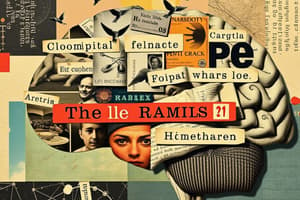Podcast
Questions and Answers
What is memory?
What is memory?
- The processing of information into the memory system
- The retention of encoded information over time
- The persistence of learning over time through the storage and retrieval of information (correct)
- The process of getting information out of memory storage
What is encoding?
What is encoding?
The processing of information into the memory system.
What is storage?
What is storage?
The retention of encoded information over time.
What is retrieval?
What is retrieval?
Define sensory memory.
Define sensory memory.
Define short-term memory.
Define short-term memory.
What is long-term memory?
What is long-term memory?
Define working memory.
Define working memory.
What is parallel processing?
What is parallel processing?
Define automatic processing.
Define automatic processing.
What is effortful processing?
What is effortful processing?
What is rehearsal?
What is rehearsal?
Define the spacing effect.
Define the spacing effect.
What is the serial position effect?
What is the serial position effect?
Define visual encoding.
Define visual encoding.
What is acoustic encoding?
What is acoustic encoding?
Define semantic encoding.
Define semantic encoding.
What is imagery?
What is imagery?
What are mnemonics?
What are mnemonics?
Define chunking.
Define chunking.
What is iconic memory?
What is iconic memory?
Define echoic memory.
Define echoic memory.
What is long-term potentiation?
What is long-term potentiation?
Define flashbulb memory.
Define flashbulb memory.
What is amnesia?
What is amnesia?
Define implicit memory.
Define implicit memory.
What is explicit memory?
What is explicit memory?
What is the hippocampus?
What is the hippocampus?
Define recall.
Define recall.
What is recognition?
What is recognition?
Define relearning.
Define relearning.
What is priming?
What is priming?
Define deja vu.
Define deja vu.
What is mood-congruent memory?
What is mood-congruent memory?
Define proactive interference.
Define proactive interference.
What is retroactive interference?
What is retroactive interference?
What is repression?
What is repression?
What is the misinformation effect?
What is the misinformation effect?
Define source amnesia.
Define source amnesia.
What is cognition?
What is cognition?
Define concept.
Define concept.
What is a prototype?
What is a prototype?
Define algorithm.
Define algorithm.
What is a heuristic?
What is a heuristic?
Define insight.
Define insight.
What is creativity?
What is creativity?
What is confirmation bias?
What is confirmation bias?
Define fixation.
Define fixation.
What is a mental set?
What is a mental set?
Define functional fixedness.
Define functional fixedness.
What is the representativeness heuristic?
What is the representativeness heuristic?
Define availability heuristic.
Define availability heuristic.
What is overconfidence?
What is overconfidence?
Define belief perseverance.
Define belief perseverance.
What is intuition?
What is intuition?
Define framing.
Define framing.
What is language?
What is language?
What is a phoneme?
What is a phoneme?
Define morpheme.
Define morpheme.
What is grammar?
What is grammar?
What is semantics?
What is semantics?
What is syntax?
What is syntax?
What is the babbling stage?
What is the babbling stage?
Define the one-word stage.
Define the one-word stage.
What is the two-word stage?
What is the two-word stage?
Define telegraphic speech.
Define telegraphic speech.
What is linguistic determinism?
What is linguistic determinism?
Flashcards are hidden until you start studying
Study Notes
Memory Concepts
- Memory: Persistence of learning over time through storage and retrieval of information.
- Encoding: The process of transforming information into a form suitable for storage in the memory system.
- Storage: Retention of encoded information over time, crucial for memory retention.
- Retrieval: The action of recalling or accessing information stored in memory.
Types of Memory
- Sensory Memory: Immediate and brief recording of sensory input for a fraction of a second.
- Short-Term Memory: Activated memory holding a limited number of items briefly (around 7 items).
- Long-Term Memory: A vast and relatively permanent storage for knowledge, skills, and experiences.
- Working Memory: An updated view of short-term memory focused on active processing of information.
Memory Processing Models
- Parallel Processing: Simultaneous processing of multiple aspects of information, contrasting with linear processing in traditional computing.
- Automatic Processing: Unconscious encoding of incidental details such as time and frequency.
- Effortful Processing: Requires conscious effort and focus when encoding information.
Methods and Techniques
- Rehearsal: Conscious repetition of information to encode it for storage.
- Spacing Effect: Better long-term memory retention through distributed study sessions compared to massed practice.
- Chunking: Organizing information into familiar, manageable units to enhance recall.
Types of Memory Recall
- Iconic Memory: Brief sensory memory of visual stimuli; lasts a few tenths of a second.
- Echoic Memory: Brief sensory memory for auditory stimuli; sounds can be recalled for 3-4 seconds post exposure.
- Long-Term Potentiation: Increased synaptic firing potential, believed to be essential for learning and memory.
Memory Phenomena
- Flashbulb Memory: Vivid recollection of emotionally significant events.
- Amnesia: Loss of memory, which can be either retrograde (prior memories) or anterograde (new memory formation).
- Implicit Memory: Unconscious retention independent of conscious recollection, such as skills.
- Explicit Memory: Memory that requires conscious effort, including facts and personal experiences.
Memory Retrieval and Interference
- Recall: Retrieving information without cues, akin to fill-in-the-blank tests.
- Recognition: Identifying previously learned information with cues, similar to multiple-choice tests.
- Relearning: The time saved in learning material that was previously studied.
- Proactive Interference: Older information disrupting the recall of newer information.
- Retroactive Interference: Newer learning interfering with the recall of old information.
Cognitive Biases and Heuristics
- Confirmation Bias: Searching for information that supports existing beliefs and ignoring contradictory evidence.
- Representativeness Heuristic: Assessing the probability of events based on how well they match existing prototypes.
- Availability Heuristic: Estimating the frequency of events based on how easily examples come to mind.
Language and Cognition
- Language: System of spoken, written, or signed words used to communicate meaning.
- Phoneme: The smallest sound unit in language.
- Morpheme: The smallest unit of meaning in a language.
- Grammar: Rules that govern the structure and meaning of language.
- Semantics: The study of meaning in language.
- Syntax: Rules for arranging words into coherent sentences.
Stages of Language Development
- Babbling Stage: Starting around 4 months, infants make various sounds not related to their household language.
- One-Word Stage: From ages 1 to 2, children primarily express themselves with single words.
- Two-Word Stage: Starting around age 2, children begin to form simple two-word sentences.
- Telegraphic Speech: An early speech stage where children communicate in simplified phrases like "go car."
Theories of Cognitive Processing
- Linguistic Determinism: Hypothesis suggesting that the structure of language influences how we think and perceive the world.
Studying That Suits You
Use AI to generate personalized quizzes and flashcards to suit your learning preferences.




